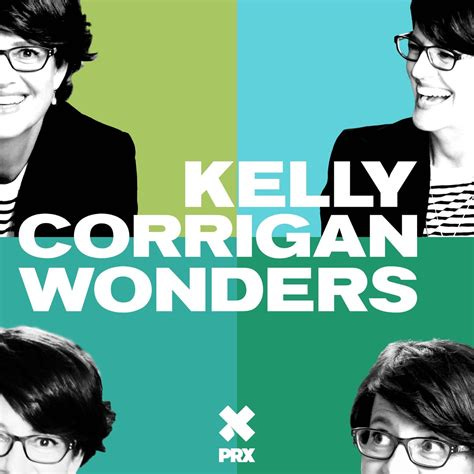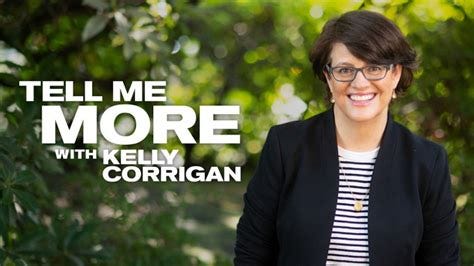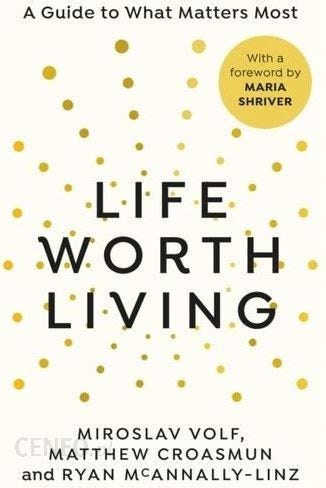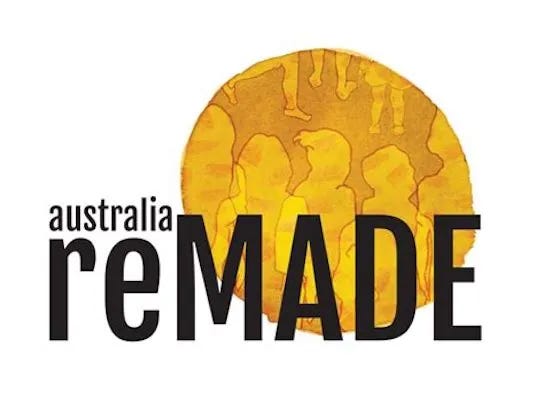Nailing It With Kelly Corrigan
This is the second of three posts. I plan to use them to introduce one organization and two individuals that even my regular readers may not know about.
This week’s post is devoted one of the many people I met as a result of the pandemic. None of them has had anything like the impact Kelly Corrigan has had on me because she keeps forcing me to come up with ways of “nailing it” as we struggle with what the Judy and Peter Blum Kovler Foundation calls “America’s neglected need.”
Who Kelly Corrigan Is
Kelly is not the kind of writer or public intellectual I’m normally drawn to.
Her bareboned Wikipedia page refers to her as a memoirist which is not one of my favorite genres. Two of her first three books revolve around what she learned from her relationship with her parents and her own nuclear family. Her second book (which I haven’t read) takes the form of a letter to her daughters inspired in part by her own brush with death after coming down with cancer when the girls were very young. She has also written a children’s book which, I have to say, my granddaughter never finished.
All that means is that I’d missed the boat. Kelly’s first book made it to #2 on the New York Times best seller list in both its hard-cover and paperback editions. She has since become a feature on the lecture tour and, more importantly for our purposes here, has become the host of a podcast and TV show. I never miss the podcast’s major episode when it drops each Tuesday—I’ll talk about her current series at the end of this post. She is also in her sixth season as host of the PBS interview show, Tell Me More, which is also the title or her second memoir.
Nailing It--How We “Met”
I hadn’t thought about using phrases like nailing it in my line of work until I encountered Kelly.
And I never saw her coming.
On April 29, 2020, Gretchen and I sat down to watch the PBS NewsHour. We were about six weeks into the pandemic. Almost everything had shut down, and almost everyone was depressed—or worse. As the show drew to a close, Judy Woodruff announced that Kelly Corrigan would give her humble opinion on what a successful post-COVID world might be like.
I am not a fan of the Humble Opinion segments and had never heard of Corrigan. But since there was little else to do, I overcame my first instinct to change the dial. Within seconds, I was transfixed. You can see why if you watch it even now almost four years later.
In case you missed some of its nuances, here is a transcript.
Sometimes, when I feel outmatched by the thing in front of me, I do a little mental exercise.
I tell myself the story of what happened, as if it's over and I nailed it.
This morning, I waited for 54 minutes to check out from the Safeway. The woman behind me, whose hair and makeup was perfect, had seven bottles of Martini & Rossi Vermouth. That's it.
And the guy in front of her had a full-face double ventilator gas mask. And I felt outmatched by the thing in front of me.
So, right there, I told myself the story of the 2020 pandemic and how we nailed it.
My success fantasy went like this. At first, it was awful, nothing but bad news on top of bad news. But then we rose up. We made soups and stews for old people and dropped them off, so they felt included and secure and nourished.
We read books to children over the Internet. We stepped outside at the end of the day and played music and clapped, so that each of us knew we were not alone.
We sent pizzas and Chinese food to E.R.s to sustain both our hospitals and our restaurants.
We called old friends and told them things we'd forgotten to say: I miss you. I still think of you. Remember that time?
We turned up, all of us, on our screens to keep businesses afloat. And in so doing, we're exposed to the more tender elements of our colleagues' lives. Pets and children were now, to our mutual benefit, in the frame.
People figured out they don't need fancy equipment to exercise. We stopped flying around and jumping in cars for no reason. Everyone planted things they could eat. We played cards with our families. We had long conversations.
We identified what kind of learning can be delivered online. We discovered that teaching is the most complex, high-impact profession known to man, and we started compensating our teachers fairly for their irreplaceable work.
Everyone voted after coronavirus. Kids who lived through the virus valued science above all. They became researchers and doctors, kicking off the greatest period of world positive discovery and innovation the planet has ever seen.
Remember that George Floyd was still alive when Corrigan spoke and that we hadn’t sunk to the polarized depths that culminated in that fall’s election and the insurrection on January 6, 2021. Still, she got at two things we will stress throughout this book—reframing and renaming the nature of our problems so that we can identify and then take some constructive steps toward “nailing” them.
Put simply, I was hooked.
Nailing It Some More
I’ve been mainlining her work ever since and spending a lot more time thinking about her notion of nailing it a whole lot more than I ever had before.
Corrigan may not define herself as a peacebuilder or even a social change analyst, but the vast majority of the work she has done since we “met” touches on the kinds of things I work on.
PBS. That starts with her PBS interview series, Tell Me More. Although I didn’t realize it at the time, she wasn’t just some person the NewsHour more or less randomly invited to do the segment. She was already under contract to start an interview program, Tell Me More, which began that fall and is now in its sixth season.
You can see how she has risen to the nailing-it task from my perspective in the introductory episode for this season.
https://www.pbs.org/video/season-6-preview-im7hfu/
If you don’t have time to watch the full half hour, here are the key passages—at least from my perspective.
I feel like the whole world is pulsing with negativity and vitriol, and there's just not enough media space devoted to world-positive people doing world-positive work.
And they're out there.
The whole impetus for "Tell Me More" comes from this idea that the media landscape is just too negative.
It's going to keep us all pinned to the sofa in states of depression.
And so we wanted to change the mix by putting forward all these positive stories of people doing great work.
A thing that's very cool about this set of conversations that we've had so far on "Tell Me More" is that you hear these threads come up over and over again in a way that's really validating.
Our best qualities are looking out for each other.
And many Americans have done that.
I truly believe that success is how much compassion you have for another human being.
These are people who have changed my outlook.
On one level, Corrigan is right here, too. The real (Steve Kerr) and near (Father Greg Boyle) celebrities she interviewed grab our attention because we, too, are convinced that our “best qualities are looking out for each other,” that “many Americans have done that,” and that “success is how much compassion you have for another human being.”
That’s what I do.
The only difference is that she does it at scale.
She may not be a peacebuilder by conventional defintions of the term, but I feel comfortable at least making an honorary one who has accomplished a lot more than those of us who have degrees in the field or are otherwise certified as experts.
Podcast. She goes a lot farther with the podcast. The core weekly episodes run for about an hour or twice the length of the television shows. Not only can she go into more depth with her guests, but she can talk with people who don’t have obvious screen appeal for gathering a big television audience to meet PBS’s expectations.
The series has also allowed her to take on topics though a string of related episodes. Right now, she is doing one on Rupture and Relationships that has, so far, covered both political polarization and the forces the drive couples toward divorce. She has done terrific series on climate change, the situation on college campuses, and a five-part exploration of the remarkable book, A Life Worth Living, by Yale’s Miroslav Volf, Matthew Croasmun, and Ryan McAnnally.
She’s even been able to find the time to interview a current friend (Amanda Ripley) and someone I taught more than thirty years ago (Dan Harris).
Even when her guest does something I don’t think I’m interested in, I learn something from the hour I spend listening while I’m on my daily walk around the neighborhood. Maybe she’s not quite as funny as “Wait! Wait! Don’t Tell Me!” (which I also listen to once a week while walking), but close. And her messages stick with you longer.
Paying it Forward. I’m also amazed at how little Kelly has let her success go to her head. Her vulnerabilities and insecurities are as obvious as her wit, insight, and interviewing skills.
More importantly, she sees the need to give back to her community of listeners and readers from which I’ve benefited personally. For much of 2023, she held monthly workshops for her fans in which she shared the topics that she was working on and helped the budding writers and others in the audience make progress on their own personal projects.
She put that initiative on hold, because she—like so many others—is having a hard time how to engage an audience of 300 or more on Zoom.
Nonetheless, it was in a breakout session at one of them that I met Lily Spencer of Australia Remade. As you will see if you click that link, Lily and her friends have jump started a lot the work we are doing on American domestic political conflict at the Alliance for Peacebuiding.
So, Go Meet Kelly and Wonder With Her
I’ve been fortunate to have spent a lot of time with a lot of really smart and thought provoking people at various stages in my life. I’m not sure any of them has left as deep or lasting impression on me as Kelly has.
Who else could blend David Byrne and Judy Woodruff into the same episode on the impact of being positive in (though I don’t remember if they used this phrase or not) nailing it.
The views and opinions expressed in this article are those of the author and do not necessarily reflect the official policy or position of the Alliance for Peacebuilding or its members.






I really resonate with your enthusiasm for Kelly Corrigan's impactful work, especially during these challenging times. It's refreshing to discover someone who not only reframes problems with such creativity but also spreads positivity. Your vivid portrayal has sparked my curiosity, and I can't wait to explore Corrigan's unique blend of wit, insight, and the art of "nailing it."